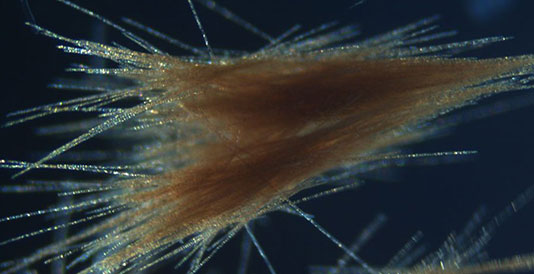 May 3, 2017 (Source: FSU) - Climate change may be putting cyanobacteria that are crucial to the functioning of the ocean at risk as the amount of carbon dioxide in the atmosphere increases and the acidity of ocean water changes. In a paper published in Science, a team of researchers from Florida State University, Xiamen University in China and Princeton University argue that the acidification of seawater caused by rising carbon dioxide levels makes it difficult for a type of cyanobacteria to perform a process called nitrogen fixation. Few people know much about a type of cyanobacteria called Trichodesmium, but this miniscule collection of cells is critical to the health of hundreds of species in the Earth’s oceans. Through nitrogen fixation, Trichodesmium converts nitrogen gas into ammonia and other molecules that organisms are dependent on for survival. Trichodesmium is thought to be responsible for about 50 percent of marine nitrogen fixation, so a decline in its ability could have a major ripple effect on marine ecosystems. “This is one of the major sources of nitrogen for other organisms in the open ocean,” said Sven Kranz, assistant professor of Earth, Ocean and Atmospheric Science at Florida State University and a co-author of this study. “If Trichodesmium responds negatively to the environmental changes forced upon the ocean by fossil fuel burning, it could have a large effect on our food web.”
May 3, 2017 (Source: FSU) - Climate change may be putting cyanobacteria that are crucial to the functioning of the ocean at risk as the amount of carbon dioxide in the atmosphere increases and the acidity of ocean water changes. In a paper published in Science, a team of researchers from Florida State University, Xiamen University in China and Princeton University argue that the acidification of seawater caused by rising carbon dioxide levels makes it difficult for a type of cyanobacteria to perform a process called nitrogen fixation. Few people know much about a type of cyanobacteria called Trichodesmium, but this miniscule collection of cells is critical to the health of hundreds of species in the Earth’s oceans. Through nitrogen fixation, Trichodesmium converts nitrogen gas into ammonia and other molecules that organisms are dependent on for survival. Trichodesmium is thought to be responsible for about 50 percent of marine nitrogen fixation, so a decline in its ability could have a major ripple effect on marine ecosystems. “This is one of the major sources of nitrogen for other organisms in the open ocean,” said Sven Kranz, assistant professor of Earth, Ocean and Atmospheric Science at Florida State University and a co-author of this study. “If Trichodesmium responds negatively to the environmental changes forced upon the ocean by fossil fuel burning, it could have a large effect on our food web.”











